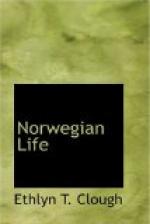King Oscar’s motto was Broedrafolkens Vael “The Brother-Peoples Weal!” The Scandinavian peninsula is still populated by brother-peoples, as was indicated at the time of the death of the old king. It was the week for the distribution in Norway of the Nobel prizes, always attended in Christiania with great rejoicing and merry-making. On this occasion all demonstration was prohibited, and the Norwegian capital was almost as much in mourning as was Stockholm. Though entirely devoted to the new order of things, the Norwegians did not forget, nor will they forget, the character of the king who ruled them for a generation. More democratic than the Swedes, they were peculiarly attached personally, if not politically, to one whom they felt to be really of like democratic instincts with themselves, even if he did show himself every inch a king.
Not only as a ruler, but as a father, King Oscar was both wise and fortunate. Four sons came to him through his marriage, and these have proved men of his own type. The Crown Prince Gustave was born just one year after the marriage of his parents, on June 16th, at the Castle of Drottingholm, in the year 1858; Prince Oscar, known as Prince Bernadotte, was born on Nov. 15, 1859, at Stockholm; Prince Carl on Feb. 27, 1861, also at Stockholm; while the youngest, Prince Eugene, like his eldest brother, first saw the light at the Castle of Drottingholm, on Aug. 1, 1865. As has been previously stated, the Crown Prince (now king) was married to the Princess Victoria of Bade, granddaughter of Emperor William I of Germany, and great-granddaughter of the exiled Gustavus IV of Sweden. The third son, Prince Carl, is wedded to his cousin, the Princess Ingeborg of Denmark, which was a source of great satisfaction to King Oscar and




